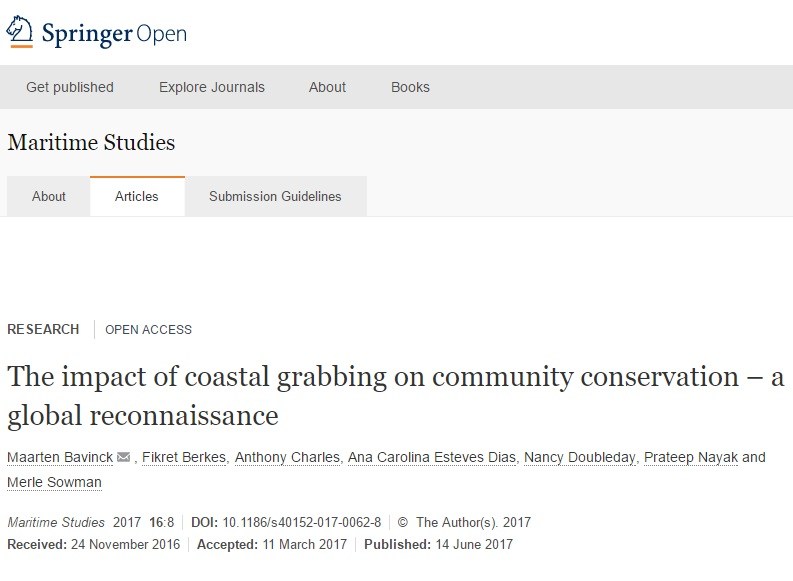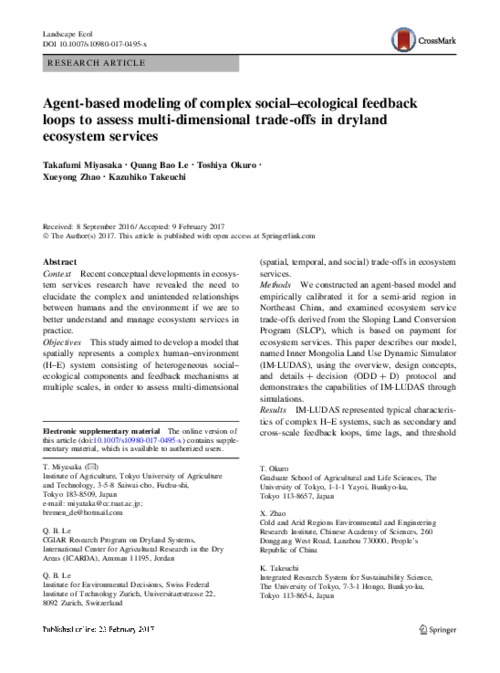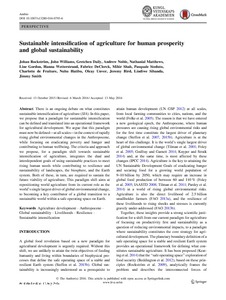About Springer
Throughout the world, we provide scientific and professional communities with superior specialist information – produced by authors and colleagues across cultures in a nurtured collegial atmosphere of which we are justifiably proud.
We foster communication among our customers – researchers, students and professionals – enabling them to work more efficiently, thereby advancing knowledge and learning. Our dynamic growth allows us to invest continually all over the world.
We think ahead, move fast and promote change: creative business models, inventive products, and mutually beneficial international partnerships have established us as a trusted supplier and pioneer in the information age.
Members:
Resources
Displaying 21 - 25 of 1195The impact of coastal grabbing on community conservation – a global reconnaissance
Coastal grab refers to the contested appropriation of coastal (shore and inshore) space and resources by outside interests. This paper explores the phenomenon of coastal grabbing and the effects of such appropriation on community-based conservation of local resources and environment. The approach combines social-ecological systems analysis with socio-legal property rights studies.
Agent-based modeling of complex social–ecological feedback loops to assess multi-dimensional trade-offs in dryland ecosystem services
Context: Recent conceptual developments in ecosystem services research have revealed the need to elucidate the complex and unintended relationships between humans and the environment if we are to better understand and manage ecosystem services in practice.
Objectives: This study aimed to develop a model that spatially represents a complex human–environment (H–E) system consisting of heterogeneous social–ecological components and feedback mechanisms at multiple scales, in order to assess multi-dimensional (spatial, temporal, and social) trade-offs in ecosystem services.
End of Desertification? Disputing Environmental Change in the Drylands
It took scientists more than three decades to transform a perceived desertification crisis in the Sahel into a non-event. Looking beyond the Sahel, the chapters in this book provide case studies from around the world that examine the use and relevance of the desertification concept.
Sustainable intensification of agriculture for human prosperity and global sustainability
There is an ongoing debate on what constitutes sustainable intensification of agriculture (SIA). In this paper, we propose that a paradigm for sustainable intensification can be defined and translated into an operational framework for agricultural development. We argue that this paradigm must now be defined—at all scales—in the context of rapidly rising global environmental changes in the Anthropocene, while focusing on eradicating poverty and hunger and contributing to human wellbeing.
Sustainable intensification of agriculture for human prosperity and global sustainability
There is an ongoing debate on what constitutes sustainable intensification of agriculture (SIA). In this paper, we propose that a paradigm for sustainable intensification can be defined and translated into an operational framework for agricultural development. We argue that this paradigm must now be defined—at all scales—in the context of rapidly rising global environmental changes in the Anthropocene, while focusing on eradicating poverty and hunger and contributing to human wellbeing.





